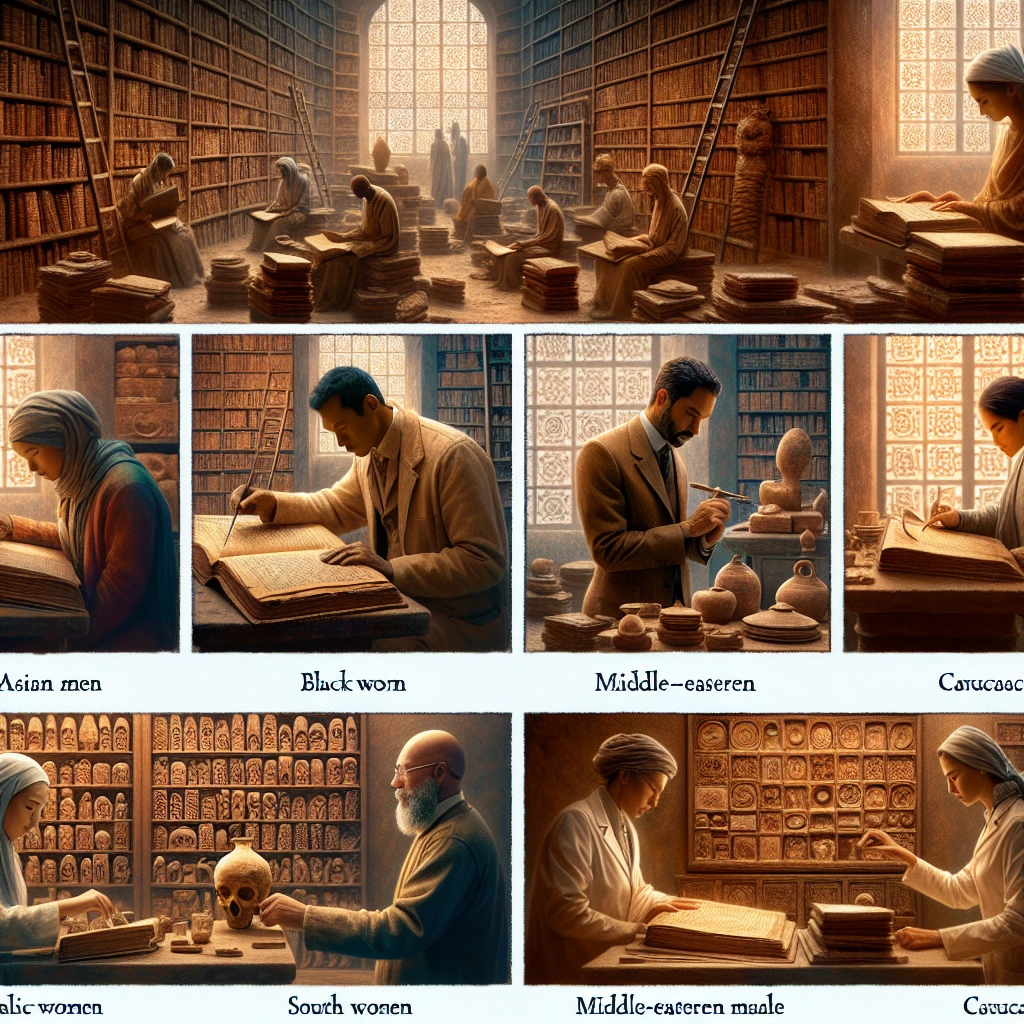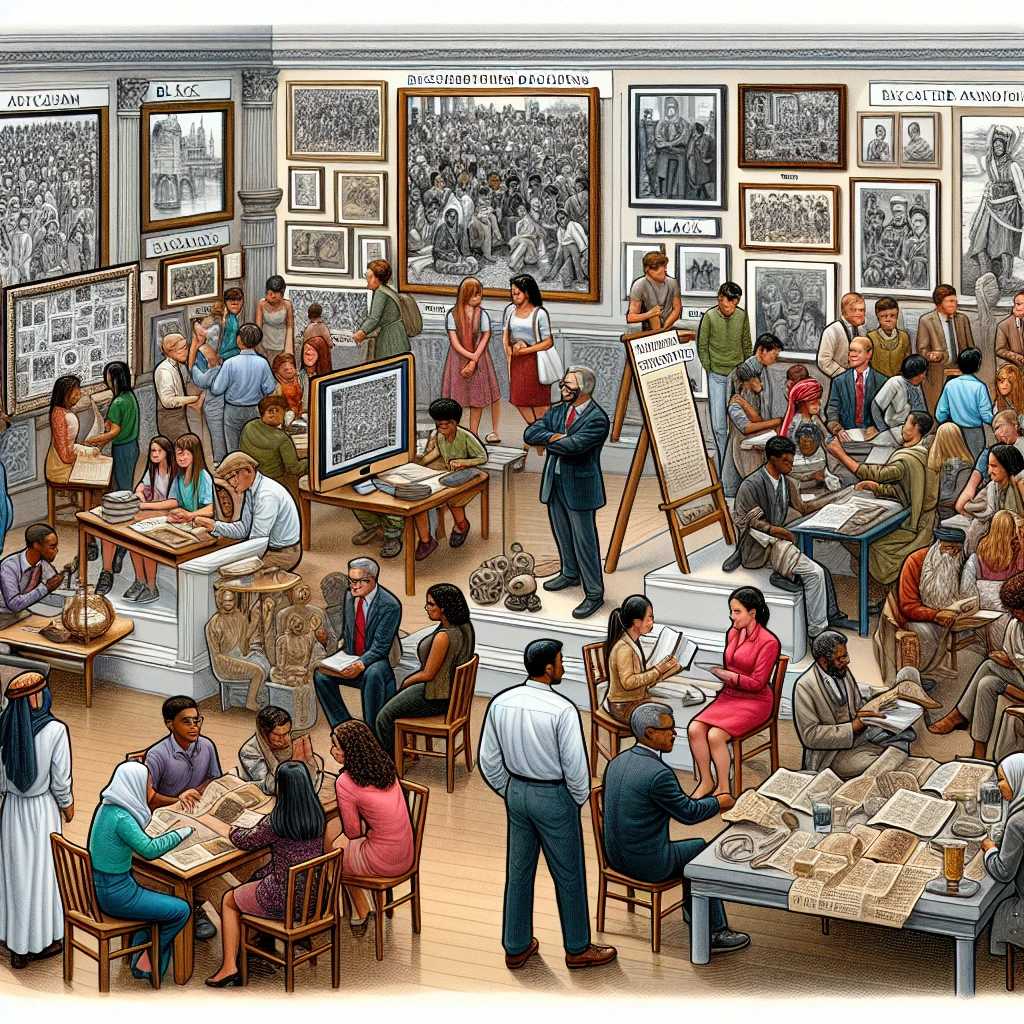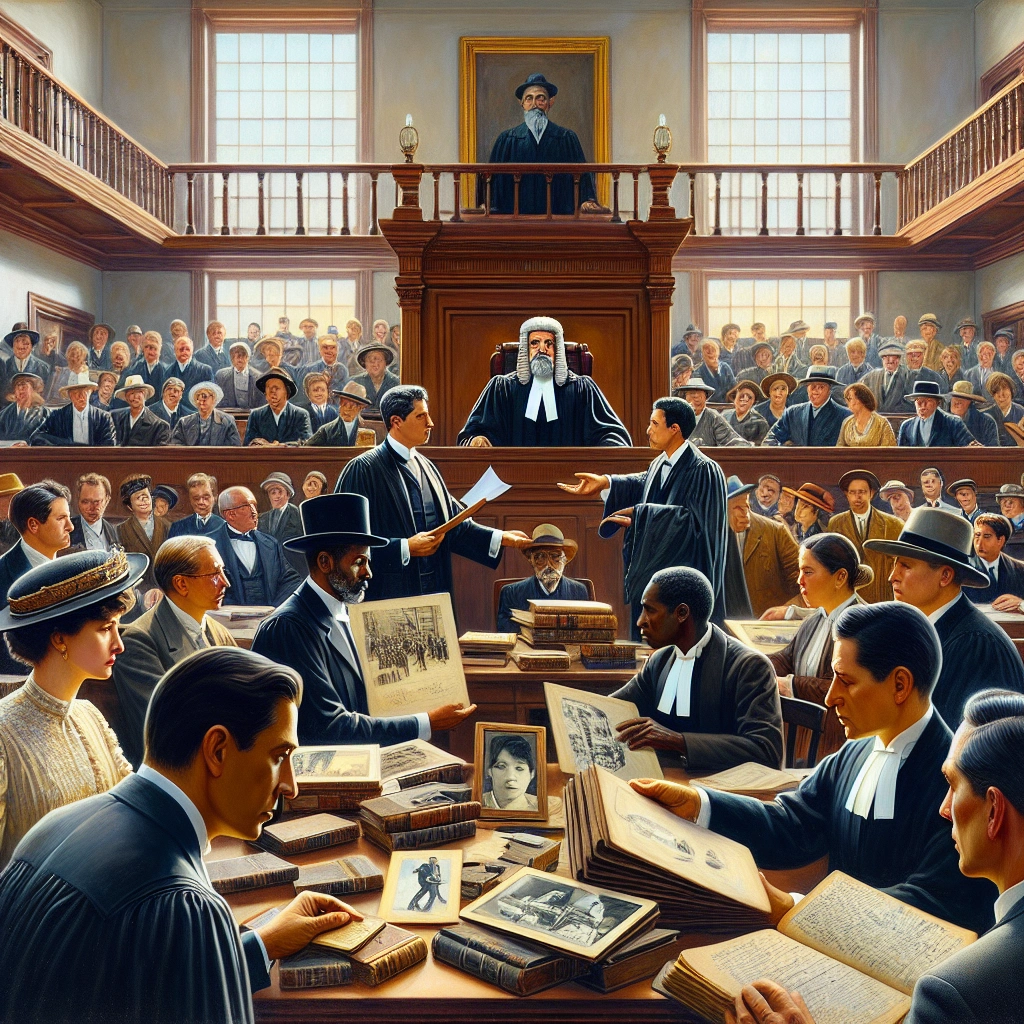Why Is Historical Evidence Important: Uncovering The Past


Historical evidence is a crucial component of understanding the past, as it provides tangible sources of information about events, people, and cultures from bygone eras. The importance of historical evidence lies in its ability to serve as a basis for historical research and analysis, allowing historians to gain insight into the factors that have shaped the world we live in today.
By examining historical evidence, we are able to make sense of the past, learn from the mistakes of previous generations, and gain a deeper understanding of our own identity and the world around us.
Check out this Youtube video: If you want to understand the importance of historical evidence and the methods used by historians to uncover the truth, this video provides great insight.
Understanding Historical Evidence
Types of historical evidence
Historical evidence comes in various forms, each shedding light on different aspects of the past. Written evidence, encompassing manuscripts, documents, and books, provides detailed accounts and perspectives from historical periods.
Oral evidence, stemming from interviews and oral histories, offers firsthand narratives, enriching our understanding of events. Visual evidence, inclusive of photographs, paintings, and artifacts, provides a tangible connection to history.
Lastly, physical evidence, such as archaeological finds, offers tangible remnants of past civilizations, giving us invaluable insights into their lives.
Reliability of different types of evidence
The reliability of historical evidence is crucial in ensuring the accuracy of our historical understanding. Primary sources, like original documents and artifacts created at the time of study, are widely considered the most reliable.
Their direct connection to the historical period and events they depict gives them unmatched authority. Secondary sources, though valuable, require careful evaluation of their credibility and objectivity.
Evaluating sources based on factors like depth, objectivity, and currency ensures the overall trustworthiness and integrity of historical evidence for accurate interpretation and analysis.
| Type of Evidence | Reliability |
|---|---|
| Written Evidence | High |
| Oral Evidence | Medium |
| Visual Evidence | High |
| Physical Evidence | Varied depending on preservation |
Historical evidence serves as a vital foundation for our understanding of events, societies, and cultures of the past. By comprehensively evaluating the reliability and significance of each type of evidence, historians and researchers can construct a more accurate and nuanced portrayal of history for future generations to appreciate and learn from.
Preserving Historical Evidence
Importance of preserving evidence for future generations
Preserving historical evidence is crucial for future generations as it provides a tangible connection to the past, enabling them to understand and learn from the events, cultures, and societies that have shaped the world. It allows people to comprehend the struggles, achievements, and innovations of previous generations, instilling a sense of identity and heritage.
Methods for preserving historical evidence
Preservation of historical evidence involves a combination of physical and digital techniques. Physical preservation includes selecting secure and climate-controlled storage locations to minimize environmental risks.
Digital preservation, on the other hand, entails converting historical documents into digital formats for long-term accessibility while ensuring the safety and integrity of the data.
Analyzing Historical Evidence
Tools and techniques for analyzing historical evidence
To effectively analyze historical evidence, historians rely on a range of tools and techniques. These include primary sources such as journals, newspaper articles, letters, and court records.
Additionally, the use of libraries with printed books and journals, as well as museum collections, remain fundamental for historical research. These provide valuable insights into events of the past, offering a window into the lives and perspectives of people across different time periods.
Historical analysis and interpretation are guided by specific tools and techniques that enhance understanding. This involves assessing evidence, including instruments, individuals, and controversies that play a crucial role in shaping historical inquiries.
Historians analyze evidence through a learned skill-set, such as comprehending the context and nature of the evidence and drawing meaningful conclusions based on it. This is essential for acquiring a holistic understanding of historical events and their repercussions.
Importance of critical analysis in interpreting evidence
Critical analysis is paramount in interpreting historical evidence as it ensures rigorous and accurate storytelling about the past. Historians follow a rigorous methodology and must assess evidence to create compelling narratives based on solid evidence.
This includes evaluating the soundness of historical interpretations to ensure the authenticity and credibility of the stories told. Critical analysis allows historians to unearth multiple perspectives, leading to a more comprehensive and insightful understanding of historical events.
| Tools and Techniques for Historical Research |
|---|
| 1. Primary sources: journals, letters, and court records |
| 2. Libraries with printed books and journals |
| 3. Museum collections |
| 4. Comprehension of evidence |
| 5. Rigorous historical methodology |
| 6. Assessment of evidence |
| 7. Creation of compelling narratives |
| 8. Evaluation of historical interpretations |
The tools and techniques for examining historical evidence coupled with critical analysis are indispensable for unearthing the truths of the past. Historians utilize these methods to construct accurate and insightful narratives and ensure that the historical events are comprehensively understood by future generations.
Historical Evidence in Education
Role of historical evidence in shaping curriculum
Historical evidence plays a crucial role in shaping the curriculum by providing insights into societal developments, cultural shifts, and past educational practices. By studying historical evidence, educators can understand the evolution of teaching methods, curriculum structures, and societal norms, thereby informing the design and implementation of modern curricula.
Using evidence to understand different perspectives
Historical evidence offers a unique opportunity to understand different perspectives by examining primary sources, artifacts, and accounts from various time periods. This enables students to gain a deeper appreciation of diverse viewpoints, cultural contexts, and historical events, fostering critical thinking and empathy.
Analyzing historical evidence empowers learners to comprehend the complexities of past societies, encouraging a more nuanced understanding of contemporary global issues.
Historical Evidence in Research
Impact of historical evidence on academic research
Historical evidence plays a crucial role in shaping academic research by providing a strong foundation for understanding past events and making informed interpretations. It allows researchers to analyze significant milestones, patterns, and shifts in history, offering valuable perspectives that contribute to the advancement of knowledge.
By incorporating historical evidence, academics can gain insights into societal, cultural, and political developments, enabling them to make well-informed connections and draw meaningful conclusions. Historical evidence serves as a cornerstone for academic research, guiding scholars toward a deeper understanding of the past and its implications on the present and future.
Incorporating evidence into scholarly work
Incorporating historical evidence into scholarly work enhances the credibility and relevance of research findings. By integrating primary sources, such as diaries, letters, and government documents, along with secondary materials, scholars can provide strong support for their arguments and conclusions.
This approach not only bolsters the authenticity of the work but also contributes to its richness and depth, enabling a more comprehensive exploration of historical events. Additionally, evaluating the reliability of sources ensures that the information used in scholarly work is trustworthy, further strengthening the impact and credibility of the research output.
Importance in Understanding Human Behavior
Historical evidence plays a pivotal role in understanding human behavior as it provides valuable insights into the patterns and motivations that have shaped our actions and decisions over time. By studying past events and the behavior of individuals and societies, we can identify recurring trends, triggers, and outcomes, allowing us to gain a deeper understanding of why people act the way they do in various circumstances.
This knowledge empowers us to make informed predictions and informed decisions based on historical precedents, thus contributing to the advancement of psychology and our comprehension of human behavior.
How historical evidence helps in understanding human behavior
Historical evidence helps in understanding human behavior by serving as a mirror that reflects our past actions and experiences. It offers a broad spectrum of behavioral data, including societal dynamics, cultural influences, and individual responses to external stimuli.
By examining historical documents, artifacts, and accounts, psychologists can draw correlations between past events and present-day behaviors, shedding light on the roots of certain attitudes, thought processes, and reactions. This enables a comprehensive analysis of human behavior through the lenses of historical context, aiding in the development of more effective psychological theories and interventions.
Examples of evidence shaping understanding of human behavior
One compelling example of historical evidence shaping our understanding of human behavior is the study of ancient civilizations and their social structures. Through the examination of archaeological findings and historical records, researchers have uncovered invaluable insights into the daily lives, belief systems, and societal norms of our ancestors.
These discoveries have provided psychologists with a wealth of data to compare and contrast with modern-day behaviors, enabling them to identify enduring behavioral patterns and understand the influences of tradition, culture, and environment on human conduct. Furthermore, case studies of significant historical events, such as wars, revolutions, and scientific breakthroughs, offer profound examples of how collective human behavior has been shaped by historical circumstances, thus deepening our comprehension of human nature and societal dynamics.
| Pros of Historical Evidence | Cons of Historical Evidence |
|---|---|
| Provides insights into patterns and motivations | May lack comprehensive data |
| Empowers informed decision-making | Interpretation bias potential |
| Enables predictions based on precedents | Limited to available historical records |
Role in Building Identity and Culture
Use of historical evidence in building national identity
Historical evidence plays a crucial role in building a nation’s identity by providing a foundation for shared experiences, values, and traditions. It helps to create a collective memory that shapes the national narrative and fosters a sense of pride and belonging among citizens.
For example, in Canada, historical evidence such as the heroic deeds of the Mounties symbolize the nation’s authority and resilience, contributing to the construction of a strong national identity.
Impact of evidence on cultural preservation
Historical evidence also significantly impacts cultural preservation by serving as a link to the past and securing the heritage of a community. It enables the preservation of artifacts, traditions, and customs that reflect the identity and values of a society.
For instance, UNESCO’s successful efforts in preserving cultural heritage demonstrate how historical evidence contributes to building a better world by maintaining the cohesion and identity of diverse communities. This preservation ensures that cultural elements remain accessible for future generations, enriching their understanding of their roots and contributing to cultural continuity.
Challenging Biases and Misconceptions
Uncovering historical truths through evidence
Historical evidence is crucial in uncovering the truths of the past. It serves as a powerful tool to challenge preconceived notions and shed light on the reality of historical events.
By analyzing primary sources, artifacts, and documents, historians can effectively validate or debunk common misconceptions, allowing for a more accurate depiction of history.
Addressing bias and misconceptions
Addressing bias and misconceptions in historical narratives is essential for presenting an unbiased view of the past. Historical evidence enables us to scrutinize prevailing beliefs and narratives, ultimately fostering a deeper understanding of historical events.
By unearthing concrete evidence, we can debunk myths and challenge biased interpretations, paving the way for a more comprehensive and truthful account of history.
Historical Evidence in Legal Proceedings
Use of historical evidence in legal cases
Historical evidence holds significant weight in legal cases as it provides crucial insights into past events, behaviors, and circumstances. For instance, in cases involving property disputes, historical evidence such as old land deeds, maps, and records become pivotal in establishing property rights and boundaries.
Influencing legal decisions based on historical evidence
Historical evidence can greatly influence legal decisions by providing context and clarity to complex legal disputes. For example, in criminal cases, historical evidence such as prior incidents or patterns can be used to establish motive, intent, and modus operandi, ultimately impacting the outcome of the proceedings.
Ethical Considerations in Using Historical Evidence
Ensuring proper handling and interpretation of evidence
Ensuring that historical evidence is handled and interpreted properly is crucial for maintaining the integrity of historical research. By carefully handling and interpreting evidence, historians can avoid misrepresenting historical events and individuals.
Proper handling also ensures that the evidence is accurately reflected in historical narratives, preserving the authenticity of the past for future generations.
To achieve this, historians must meticulously verify the authenticity of historical documents and artifacts. By employing methods such as carbon dating, handwriting analysis, and cross-referencing with other primary sources, they can ensure the reliability of the evidence.
Additionally, employing a diverse range of perspectives and interpretations helps in avoiding biased interpretations.
Furthermore, employing modern technology, such as digital mapping and 3D modeling, can aid in the accurate interpretation and representation of historical evidence. These tools enable historians to provide a more comprehensive understanding of historical events and places, enhancing the overall accuracy and reliability of the historical narrative.
Addressing ethical concerns in historical research
Addressing ethical concerns in historical research is essential to uphold the integrity of the discipline. Historians must adhere to ethical guidelines to ensure the fair and unbiased representation of historical evidence.
This involves disclosing any conflicts of interest and biases that may influence the interpretation of historical events.
Moreover, historians should avoid cherry-picking evidence to fit a particular narrative and instead strive to present a well-rounded and comprehensive representation of historical events. Acknowledging contradictory evidence and engaging in open discussions about differing interpretations are crucial for addressing ethical concerns and maintaining historical accuracy.
In addition, seeking input and feedback from peers in the historical community can help in identifying and mitigating any ethical concerns that may arise during the research process. Collaboration and peer review ensure that historical research maintains high ethical standards and remains a reliable source of information for future generations.
| Ethical Considerations in Historical Research |
|---|
| Proper handling and interpretation of evidence |
| Addressing ethical concerns in historical research |
Misinterpretation and Misuse of Historical Evidence
Consequences of misinterpreting evidence
| Misuse of Historical Evidence | Consequences of Misinterpreting Evidence |
|---|---|
| ISIS and Trump leverage murky historical interpretations to serve their ideologies, distorting historical truths. | Misinterpretation of historical evidence can perpetuate misunderstandings and support inappropriate ideologies. |
| In forensic science, the misinterpretation of evidence led to potential miscarriages of justice in 22% of critical cases. | Misuse of historical evidence in legal proceedings can result in wrongful convictions and compromised justice system. |
| False beliefs in fear appeals demonstrate the misuse of evidence and distortion of historical events for persuasion. | Misinterpretation of historical evidence can lead to false beliefs and misguided decision-making in various contexts. |
Misusing historical evidence can have far-reaching implications, influencing societal beliefs, legal outcomes, and decision-making. Understanding the examples and consequences highlights the critical importance of accurate interpretation and use of historical evidence in shaping our understanding of the past and influencing the present and future.
Historical Evidence in Archaeology
Importance of evidence in archaeological discoveries
Historical evidence is crucial in archaeological discoveries as it provides tangible proof of past human activities, cultural practices, and societal structures. Artifacts and features unearthed through archaeological excavations serve as vital pieces of the puzzle, enabling archaeologists to reconstruct and understand ancient civilizations.
Without historical evidence, our understanding of the past would be limited to mere speculation and theoretical constructs. For example, the discovery of pottery fragments, tools, and ancient structures not only validates historical accounts but also sheds light on the technological advancements and lifestyles of ancient societies.
Impact of evidence on understanding ancient civilizations
The impact of historical evidence on understanding ancient civilizations is profound. It allows us to delve into the daily lives, beliefs, and societal norms of past cultures.
For instance, the excavation of burial sites and religious artifacts provides insights into ancient burial practices and spiritual beliefs, contributing to a deeper comprehension of their worldviews. Furthermore, historical evidence assists in tracing the development of human civilizations, deciphering cultural exchanges, and unraveling the complexities of societal hierarchies.
By examining tangible evidence, archaeologists can paint a more accurate and vivid picture of how our ancestors lived and thrived, bridging the gap between the past and the present.
Digitalization of Historical Evidence
Digitizing historical evidence has numerous advantages, including preservation of fragile documents and improved accessibility for researchers. By digitizing records, organizations can prevent the deterioration of valuable information and ensure its longevity.
| Advantages of Digitizing Historical Evidence | Challenges of Digitizing Historical Evidence |
|---|---|
| Preserves fragile documents | Proprietary and obsolete formats |
| Improves accessibility for researchers | Lower quality digital sources |
| Simplifies research and maximizes efficiency | Data preservation against obsolescence and loss |
| Increases access to historical records |
The process, however, also comes with challenges such as dealing with proprietary and obsolete formats, as well as the lower quality of digital sources. Additionally, the burden of preserving both the original records and their digital copies against obsolescence and data loss presents a significant challenge.
When it comes to accessibility, digitization allows historical evidence to be accessed through digital platforms, democratizing access to historical records and enabling diverse research. Platforms like digital archives can support research and facilitate interaction with historical materials, transforming historical research in the digital age.
The Future of Historical Evidence
In the realm of historical evidence, emerging technologies are revolutionizing the preservation and analysis of historical artifacts and information. Technologies like drones, 3-D scanning, and GPS are enabling the documentation of historical sites with unprecedented accuracy.
Additionally, digital technologies have opened new avenues for preserving historically significant archaeological sites, providing comprehensive scan data that ensures the preservation of invaluable historical evidence.
Moreover, historians have increasingly embraced machine learning and deep neural networks to examine historical documents, shedding new light on ancient astronomical tables and other historical records. These advancements have transformed the way historical evidence is gathered, managed, and interpreted, bringing forth a new era of historical analysis and understanding.
As technology continues to evolve, its pivotal role in safeguarding and interpreting historical evidence cannot be overstated.
Furthermore, the evolving perspectives on the importance of historical evidence are shaping the way societies perceive and utilize historical records. It goes beyond mere documentation and delves into preserving cultural heritage for present and future generations.
The development of historical technology is fostering a deeper understanding of our past, allowing us to glean invaluable insights from historical evidence and expand our comprehension of the world’s rich tapestry of history and culture.
| Emerging technologies in preserving and analyzing evidence | Evolving perspectives on the importance of historical evidence |
|---|---|
| Drones, 3-D scanning, GPS, and digital technologies have revolutionized historical site documentation. | Machine learning and deep neural networks are transforming historical record analysis. |
| Preservation of historical sites through comprehensive scan data ensures the safeguarding of valuable evidence. | Evolving perceptions emphasize the cultural and societal importance of preserving historical evidence for future generations. |
The future of historical evidence is intricately entwined with groundbreaking technological advancements and an evolving consciousness regarding the significance of preserving our historical heritage. These factors collectively contribute to forging a brighter and more profound understanding of our collective past, underscoring the indelible importance of historical evidence in shaping our present and future.
Recommended Amazon Products for Understanding Historical Evidence
Here’s a curated list of products that can help you in understanding the importance of historical evidence with ease. These recommendations are based on the relevance to the topic and positive customer reviews.
1. Kindle Paperwhite
The Kindle Paperwhite is a great tool for accessing digital historical evidence. It allows you to store and read digital copies of historical documents and texts. Access the Kindle Paperwhite here.


| Pros | Cons |
|---|---|
| 1. Portable and convenient | 1. Requires access to digital historical documents |
| 2. Long battery life | 2. Initial investment in the device |
2. National Geographic Visual Atlas of the World
This comprehensive atlas provides historical maps and evidence of past civilizations. It is a valuable resource for understanding the context of historical events. Find the National Geographic Atlas here.


| Pros | Cons |
|---|---|
| 1. Detailed historical maps | 1. Limited to physical format |
| 2. High-quality visuals | 2. May be expensive |
3. The Oxford Encyclopedia of Ancient Egypt
For those interested in ancient civilizations, this encyclopedia offers in-depth historical evidence of ancient Egypt. It’s a valuable reference for researchers and enthusiasts. Explore the Oxford Encyclopedia here.


| Pros | Cons |
|---|---|
| 1. Comprehensive information | 1. Specialized focus on ancient Egypt |
| 2. Authoritative source | 2. Large and heavy book |
4. History: From the Dawn of Civilization to the Present Day
This educational book provides a broad overview of historical evidence from various periods. It’s perfect for those seeking a comprehensive understanding of historical events. Check out the history book here.


| Pros | Cons |
|---|---|
| 1. Wide-ranging coverage | 1. Requires time to read and digest |
| 2. Engaging and informative | 2. Large and heavy book |
5. Fujitsu ScanSnap iX1500 Color Duplex Document Scanner
This scanner is perfect for digitizing historical documents and preserving them for future reference. It simplifies the process of storing and accessing historical evidence. View the Fujitsu scanner here.


| Pros | Cons |
|---|---|
| 1. High-quality scanning | 1. Requires budget for purchase |
| 2. Efficient digitization | 2. Initial setup process |
Top Recommended Product for Understanding Historical Evidence
If you’re looking for the best solution for understanding historical evidence, we highly recommend the Kindle Paperwhite. It’s a versatile tool for accessing and storing digital historical documents. Ready to improve your understanding of historical evidence? Check out the
today for the best results!Conclusion
Historical evidence is important because it provides concrete proof of past events, actions, and cultures. This evidence helps us to understand and interpret the past, allowing us to learn from historical mistakes and successes.
Without historical evidence, our understanding of the past would be limited to speculation and interpretation, rather than factual knowledge.
Furthermore, historical evidence helps to validate the accuracy of historical accounts and narratives. By examining primary sources and artifacts, historians and scholars can verify the authenticity of historical events and the reliability of historical records.
This validation is essential for establishing a comprehensive and accurate understanding of history.
Moreover, historical evidence contributes to the preservation of cultural heritage and the collective memory of societies. It provides a tangible link to our past, allowing us to connect with previous generations and gain appreciation for the diverse experiences and perspectives that have shaped our world.
By preserving and studying historical evidence, we can ensure that future generations have access to a rich and comprehensive historical record.

















